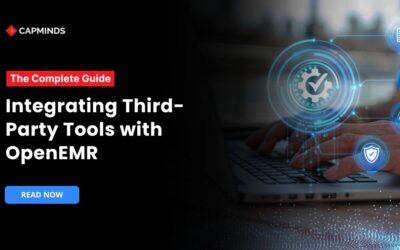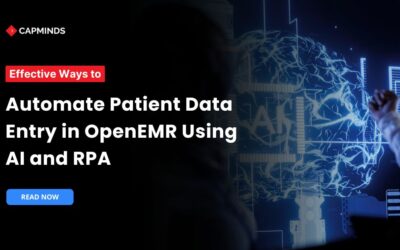OpenEMR Billing Module: How to Simplify Claims Processing and Reduce Denials
In the USA, nearly 20% of all claims are denied, a growing issue in healthcare. Denied claims lead to delayed payments, increased administrative work, and potential revenue loss. Effective medical billing is crucial for managing claims.
Medical Billing module in OpenEMR
Medical billing is crucial in healthcare administration because it ensures accurate claims processing and financial management. Managing claim submissions and insurance follow-ups can be complex and requires accuracy to prevent errors. This will enhance the billing process, improve patient care, and ensure a smooth financial process for healthcare providers.
In this blog, we’ll see how OpenEMR can help ease the claims process and minimize insurance claim denials.
Challenges in Insurance Claims and Denials
Incorrect Information
Missing or outdated patient data (age, address, contact details) can lead to denials. When the diagnosis is incomplete, the lack of necessary documents (medical history, lab results) hinders the claiming process. Data should be entered properly to ensure complete information. If the billing department fails to check for mismatched or duplicate data before submitting insurance payer, the claims will get denied.
Coding Errors
Incorrect medical codes (ICD, CPT, HCPCS) can deny insurance claims. Incorrect medical codes can lead to misinformation in medical records, resulting in claim denials and affecting the reliability of the billing system.
Coverage Issues
Coverage issues occur when an insurance plan does not cover certain medical services due to policy exclusions, benefit limitations, or exceeding the coverage amount. These restrictions can lead to denied claims, requiring patients to pay or seek alternative coverage options.
Technical Challenges
OpenEMR requires third-party integration tools for electronic insurance claims and clearinghouses. Some third-party integrations require extensive customization, which can be complex and lead to technical challenges. Frequent updates may interrupt the claims submission and processing of insurance.
Security Compliances
Ensuring all the electronic transactions adhere to security policies and standards. Errors in claim submissions can trigger audits and potential compliance risks. Frequent changes in payor policies and guidelines need to be updated in billing processes.
To solve the above challenges, OpenEMR offers automated tools and integrations that help simplify claim processing and reduce denials.
Read More: A Guide to Credentialing in the Medical Billing Process
How OpenEMR Simplifies Claims Processing
Automated Claim Generation
OpenEMR supports automated claim submission, which reduces the process of manual data entry. This automation enhances cash flow by streamlining invoices and payments, making claims processing more efficient. Automating the claims submission moves the workflow efficiency by reducing manual efforts for the billing process.
Accurate Coding & Billing
OpenEMR integrates with standardized medical coding systems such as ICD, CPT, and HCPCS to ensure accurate claims. Further, billing is processed based on these codes, ensuring security compliance and regulatory policies.OpenEMR enables providers to customize invoice templates to align with their specific practice needs.
Claim Validation & Error Detection
OpenEMR helps identify errors before claim submission using integrated validation tools. This allows healthcare providers to track and monitor the claim status. Denied Claims are flagged for quick resolution.
Report Analytics for Claims Submission
OpenEMR enhances claims processing by providing robust report analytics that offer insights into claim performance, revenue trends, and billing efficiency. These analytics help healthcare providers optimize their billing processes, reduce denials, and improve reimbursements.
Seamless Payor Integration
OpenEMR can directly integrate with the insurance payors and clearinghouses. This ensures smooth electronic transactions and faster reimbursements.
Direct integration streamlines the claims submission, reduces administrative work, and minimizes errors. This results in an effective revenue cycle for healthcare providers.
How OpenEMR Reduces Claim Denials
Real-time Eligibility Verification
OpenEMR offers tools to verify patient insurance eligibility before providing services, which prevent claim denials due to ineligible coverage of insurance.
This helps to generate invoices only for covered services in the insurance. By verifying these insurance details, practices avoid administrative burdens for processing and claim denials.
Billing Practices
Streamlining the automated billing process helps in claim submission and payment tracking, and supports both electronic and paper-based records. Users can easily generate invoices for the claim process. The system ensures the correct codes and reduces errors in claim submission.
Claim Validation & Report
OpenEMR includes validation, thus preventing data entry errors before claims are submitted. This provides accuracy on claim information, lowering the chances of rejection. Analyzes the patterns of denied claims and generates a detailed report on claim management. Flagged denials provide actionable insights.
EOB Management
EOB management by automating the payment process and tracking the balances of the patients. It supports electronic remittance advice for faster processing, matches payments with claims, and flags denials for quick resolution.
With automated denial management, customizable templates, and clear patient billing, OpenEMR helps reduce administrative workload and improve revenue flow.
By following these steps, you can streamline the OpenEMR billing module to enhance claim submission efficiency and minimize claim denials.
CapMinds OpenEMR Customization and Integration Service
CapMinds OpenEMR equips clinicians with the best features and ways to integrate. It makes their workflows more efficient and filtered.
The integrated features will allow them to combine the ability of patient record management with conceptual and concurrent reminders.
This enhances the process of decision-making and improves patient care and quality.
- At CapMinds, OpenEMR custom solutions are developed with much care and accuracy to match the special practice needs.
- It will be low-cost and the perfect budget solution for your practice’s long-term future.
- CapMinds OpenEMR prioritizes secure data management & ensures compliance with industry regulations, offering healthcare providers peace of mind.
Get the best technologies and HIPAA-compliant and efficient OpenEMR from CapMinds that can be tailored to fit your practice.
Our OpenEMR services facilitate a Modern User Interface (UI), customization, production support & training. It also facilitates billing, reporting, specialty enhancements, clearing house integrations, e-prescribing, cloud, and more.
“Get the most experienced, proven, and perfect professional support for your OpenEMR.”



